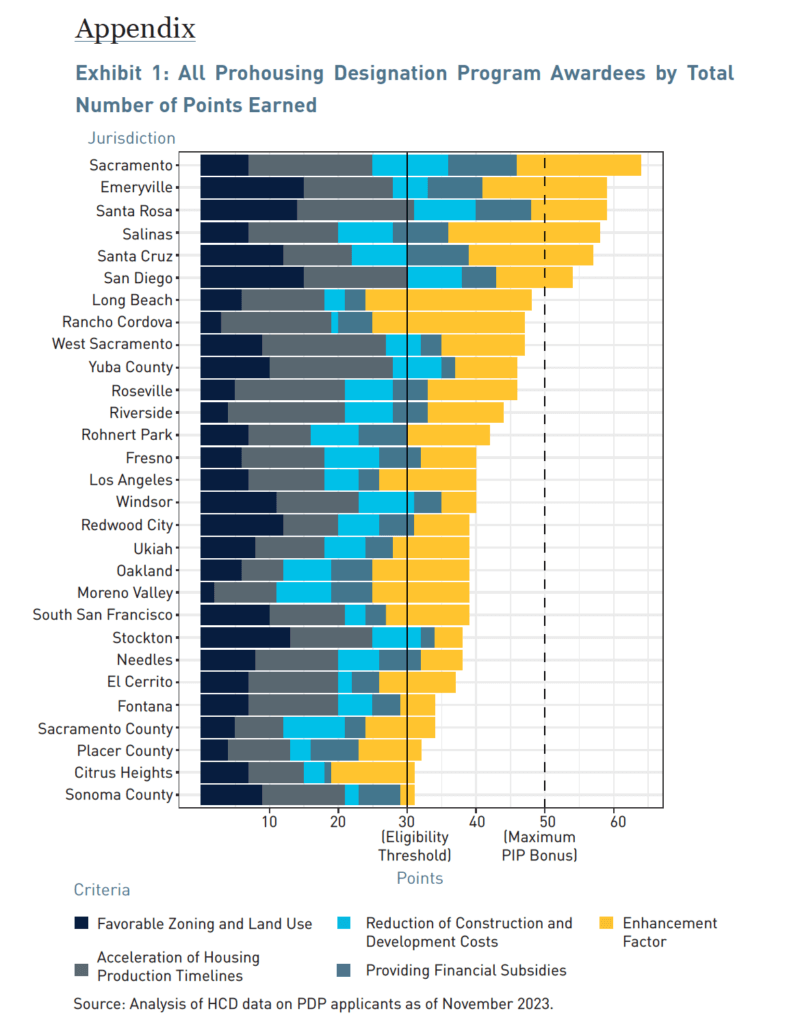California’s Prohousing Designation Program: Rewarding City and County Policies that Boost Housing Supply
Published On December 5, 2023
In the face of California’s severe housing shortage and affordability crisis, many jurisdictions nevertheless continue to block new housing developments, from the city of Woodside’s now infamous “mountain lion habitat” defense to the city of Pasadena’s liberal use of historic landmark designations that can make it harder to build. In recent years, the state has increased its enforcement efforts, for example, by pursuing legal action against Huntington Beach and other cities that have refused to adopt a Housing Element that is compliant with state law.
What is less often discussed is the fact that many jurisdictions are actually doing the opposite: creating local policies that remove obstacles to new housing. In 2021, the state formally launched a new “carrot” to incentivize exactly these kinds of behaviors: the Prohousing Designation Program (PDP). Complementing the state’s enforcement “stick”, the program is intended to help motivate elected officials to pursue housing policy changes that might not otherwise result in tangible results until years later.
The PDP uses a points-based system to evaluate a jurisdiction’s housing and development policies across four categories:
- Implementing favorable zoning and land use policies, such as rezoning to increase density, making it easier to build ADUs, and/or reducing or eliminating parking requirements.
- Accelerating building timelines, for example, by streamlining approvals and reducing the number of public hearings for project approvals.
- Reducing the costs of building new housing, e.g., by lowering impact fees or promoting the use of modular construction and other innovative housing types; and
- Providing financial subsidies, such as establishing a Housing Trust Fund or making public lands available for affordable housing development.
Jurisdictions are also awarded “enhancement” points for how they align those policies with other state priorities, such as mitigating climate change, promoting fair housing, and preventing displacement. Jurisdictions that receive the PDP designation receive an advantage in some state housing and planning grant programs, and are also eligible for a newly-created fund, the Prohousing Incentive Pilot (PIP) Program.
As of November 2023, 30 jurisdictions have received the prohousing designation, including some of the state’s largest cities like Los Angeles, Oakland, Riverside, and Sacramento, but also some smaller and rural jurisdictions such as Salinas, Ukiah, and Yuba County.

In California’s Prohousing Designation Program: Rewarding City and County Policies that Boost Housing Supply, we examine data for 10 early adopters of the PDP, and assess whether the policies for which they received points are supported by research evidence that those policies can promote new housing development.
Overall, we find that many of the policies in the PDP are evidence-driven: for example, removing zoning constraints, establishing density bonuses, reducing parking requirements, and streamlining approvals can all make it easier to build and lower the costs of development.
But we also find opportunities for improvement. A few of the PDP policies aren’t very well tied to production: for instance, posting status updates on project permit approvals is helpful for transparency, but it won’t add many new units. Others allow jurisdictions to “double count” policies—such as efforts to make it easier to build ADUs—that are included within multiple categories. Our report makes recommendations for how California’s Department of Housing and Community Development could simplify the PDP scoring.
We also recommend that HCD institute a process to regularly evaluate and update the PDP criteria. In recent years, the legislature has passed a number of prohousing policies that apply statewide, for example, streamlining affordable housing, allowing by-right development of affordable housing in commercial zones, and overturning local restrictions on ADU construction. Policies that are considered prohousing in 2023 may become baseline statewide requirements in future years. This means that program criteria will need to be updated on an ongoing basis in order to remain ahead of reforms to state law.
There’s also potential to make the PDP more impactful over the long-term. This will require a two-pronged approach. First by making the scoring more reflective of objective metrics linking policy adoption with housing production, for example, through economic modeling using parcel level land use data such as Terner Labs has done working with the City of Los Angeles. And, second, by making the designation itself more enticing through greater financial incentives, for example, by prioritizing prohousing jurisdictions for a wider range of state transportation, infrastructure, and/or climate investments.
HCD’s efforts to develop a carrot-based incentive system to spur local jurisdictions to become partners in solving the state’s housing crisis offers a model for other states that are making changes to accelerate housing supply, as well as for the federal Pathways to Removing Obstacles to Housing (PRO Housing) program. Local prohousing policies aren’t on their own going to solve the state’s housing crisis; efforts to expand supply need to be coupled with investments in homelessness and affordable housing, as well as efforts to preserve lower-cost homes and advance renter protections. But finding ways to encourage local jurisdictions to say “yes” to more housing must also be part of the overall solution.





